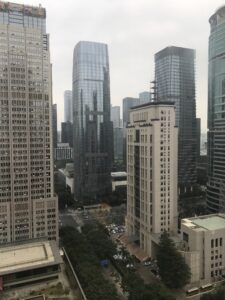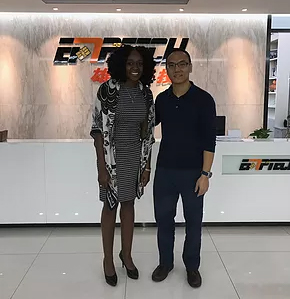This video is the 4th part of a blog series throughout 2018, with the pioneers of #TeamCharlotte to capture the opportunities and experiences in Shenzhen China in 2017. Check out the previous video blogs: Who is #TeamCharlotte and How Did They Find Out About Shenzhen, China?; Part 2 – Communication and VPN’s in China; and Part 3 – Unique Industries and Relationships in China.
The video series are very informal, and a lot of joking is probably going to happen so be prepared to laugh!
 Justin Witz: During lunch you mentioned more about business, eluding to there focus is business all the time.
Justin Witz: During lunch you mentioned more about business, eluding to there focus is business all the time.
Vanessa Vaughn: Yes.
Justin: So can you just share …. you had a meeting this morning, this is by the way, what are we Friday morning?
Vanessa: This is Friday.
Amanda Zullo: Yes.
Vanessa: We’re going to Hong Kong today.
Justin: So she’s very cool, she left us in the morning to go to a meeting.
(Laughter)
Amanda: She already had a meeting set up on this trip.
(Laughter)
Justin: They loved her business cards with the WeChat and everything.
Vanessa: And the hair!
Justin: I experienced the worst Starbucks in my life, so go ahead tell them.
(Laughter)
 Vanessa: I had an opportunity to have a meeting with a company in Shenzhen, who is a mid-sized company, with about 700 employees and they’ve been in business for over 22 years. They do public security, so when you go through the terminals at the airport and you either scan your thumb or passport, they make those machines for the government, as well as businesses, airports and a few companies like that to verify your identity.
Vanessa: I had an opportunity to have a meeting with a company in Shenzhen, who is a mid-sized company, with about 700 employees and they’ve been in business for over 22 years. They do public security, so when you go through the terminals at the airport and you either scan your thumb or passport, they make those machines for the government, as well as businesses, airports and a few companies like that to verify your identity.
I had an opportunity to ask lots of open-ended questions from some of the counterparts I had a chance to meet. What he was sharing was, the Chinese are just open to doing business. They are so focused on innovation, innovation, innovation, and growth. What I thought was interesting is America, Europe, France we’ve been doing business for a long time and we are a developed region, but the Chinese are developing.
We’ve had an opportunity to experience economic downturns, unemployment, and to really think about how we manage risk as a country, but the Chinese haven’t considered that yet. So there’s lots of opportunities from a risk management perspective to help them see how you manage risk.
One thing he also shared today that I thought was interesting is, from their perspective, Americans and Europeans have experts, but in China they don’t consider themselves experts, depending on the industry they are in. So that was pretty interesting. Because they have such a robust supply chain here, in the areas where they don’t have the expertise they utilize their local network to fill in some of those gaps.

